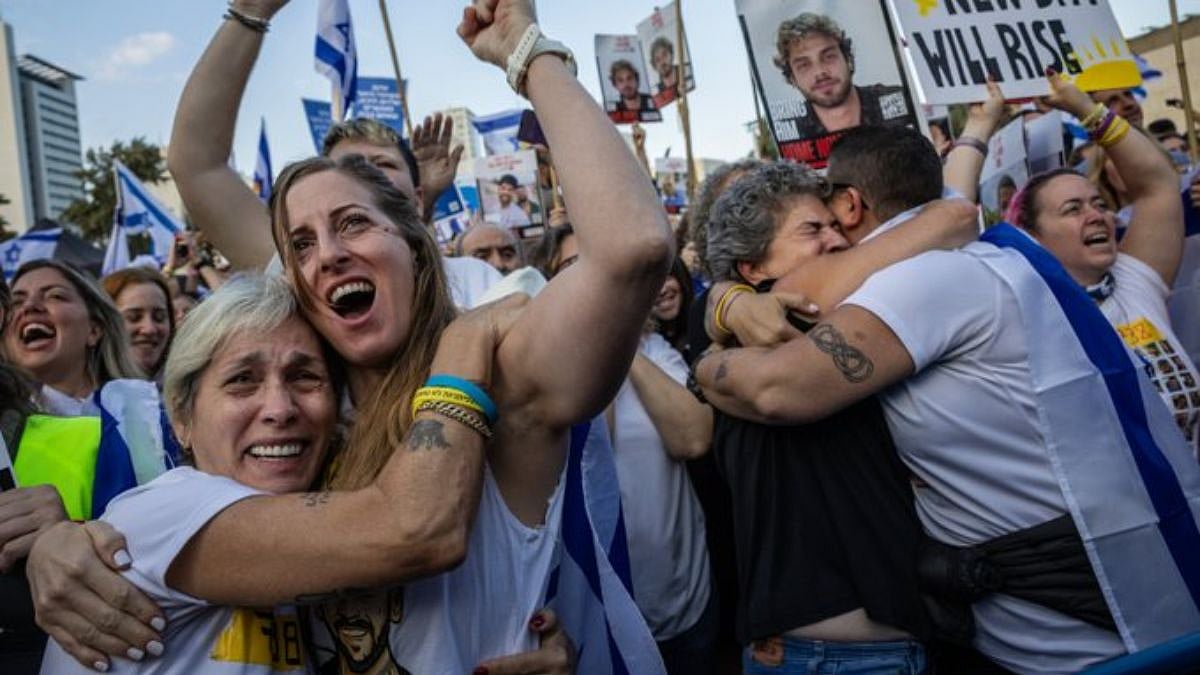Gaza Hostages Freed: Israel-Hamas Peace Accord Marks Diplomatic Breakthrough Amid Massive Humanitarian Crisis
With Hamas releasing all the remaining 20 living Israeli hostages, the first part of the peace accord has successfully concluded. What stands out is that despite the unimaginable suffering in Gaza—where people have died from bombings, hunger and disease—the hostages were reportedly and manifestly treated with a measure of care during their two years of captivity.

Israeli hostages being released by Hamas, marking the first phase of the peace accord, as world leaders hail the diplomatic breakthrough | X
With Hamas releasing all the remaining 20 living Israeli hostages, the first part of the peace accord has successfully concluded. What stands out is that despite the unimaginable suffering in Gaza—where people have died from bombings, hunger and disease—the hostages were reportedly and manifestly treated with a measure of care during their two years of captivity.
That fact alone is a faint reminder that even amid conflict, a spark of humanity can survive. The accord itself has been hailed as a triumph of diplomacy. US President Donald Trump, its chief architect, has proclaimed that the Israel–Hamas war is over. The question, however, is what comes next.
The world watches with cautious hope, aware that peace built on pain can crumble overnight. To their credit, Egypt, Qatar, the United Arab Emirates and several other regional powers also played constructive roles in securing this fragile peace. Yet the challenges that lie ahead are monumental.
Over the last two years, Gaza has unfortunately been reduced to rubble. More than 65,000 civilians, many of them children, have been killed, and almost every hospital, school, and power line has been destroyed. The people of Gaza are struggling to find food, medicines, and shelter.
Even today, Israeli forces have been accused of obstructing convoys carrying relief materials into the enclave on one pretext or another. Unless this blockade is lifted forthwith and humanitarian agencies are given unhindered access, peace will remain an empty phrase. Immediate relief must be followed by sustained rehabilitation.
Estimates suggest that at least 20 billion US dollars will be required to rebuild Gaza—a figure that underscores both the enormity of the devastation and the need for international cooperation.
The United Nations must take the lead in coordinating this effort, ensuring that reconstruction does not become another political bargaining chip. The world owes it to the people of Gaza to help them rebuild a life of dignity in their own homeland.
But the harder task lies in rebuilding trust. The second phase of the accord must focus on winning back the confidence of ordinary Palestinians and Israelis. The world has seen this story before: the Oslo Accord, brokered by President Bill Clinton, ended in tragedy with the assassination of Israeli Prime Minister Yitzhak Rabin and the collapse of hope.
Even today, hardliners on both sides remain capable of derailing peace. In Israel, there are voices that openly advocate the elimination of Palestinians.
Among Hamas, there are extremists who refuse to coexist with Israel. Both are enemies of reconciliation. True, Trump’s family and advisers worked tirelessly behind the scenes. But peace will endure only if Gaza is not treated as a real estate project but as a homeland for a people who have suffered enough.
Published on: Wednesday, October 15, 2025, 05:52 AM ISTRECENT STORIES
-
-
-
-
-